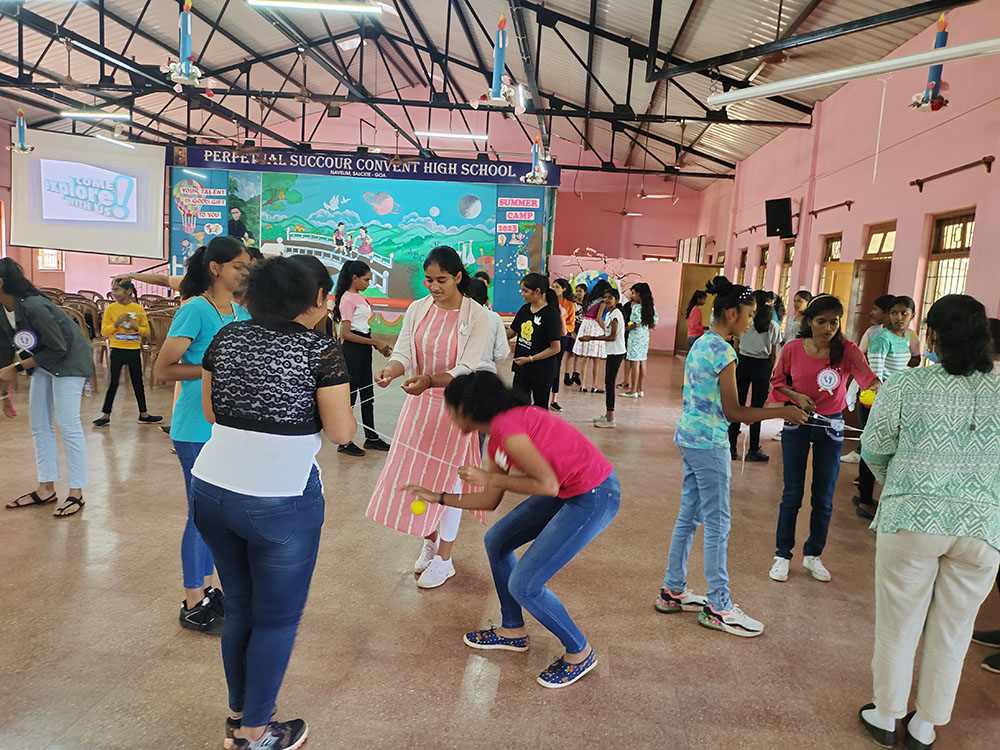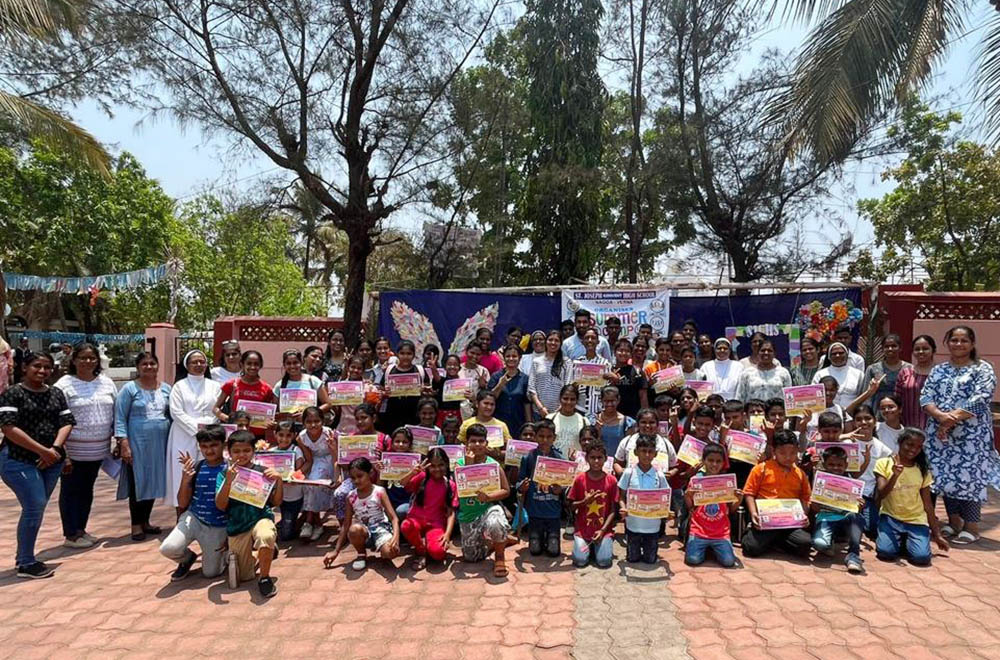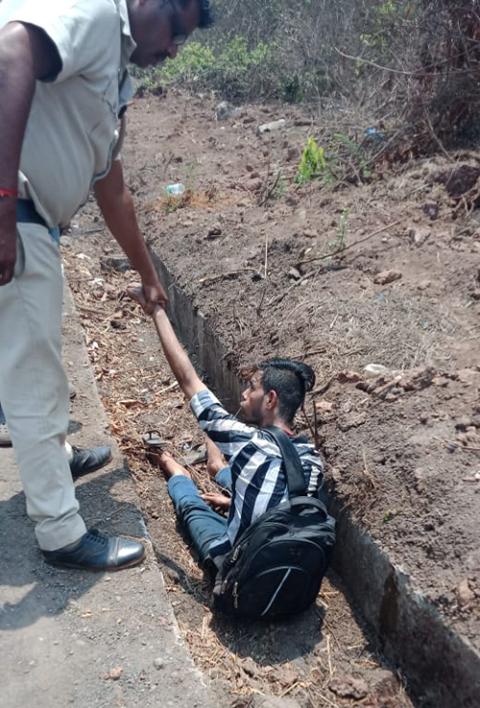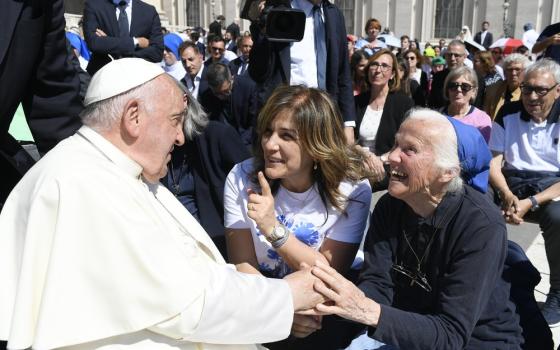
Youth participate in games at a summer camp in Goa, India. (Courtesy of Molly Fernandes)
It is the feast of St. Joseph the Worker, and the summer vacation has begun. The children are fidgety with the rise in temperatures and bother their parents — "Mama, are we not going out for an outing ... to farms, where there are pools to douse the heat and to the water springs and restaurants with beaches nearby?" — while the parents are weighed down with other responsibilities.
True, that the state of Goa, India, is blessed to have many farms located all over, and the beautiful beaches are child-friendly. The children have finished their academic year and are awaiting the results; now they want to relax and refresh themselves.
At the same time some of the schools run by religious and clergy are keeping the children engaged through summer camps and career guidance. Sometimes children hesitate to participate in the vocations camps (they don't like the talks), as today's children would rather be active than listen!
The sisters' schools — like the Holy Family of Nazareth Educational Society, St. Joseph's Convent High School, Perpetual Succour Convent High School, and St. Joseph Vaz High School — had summer camps for one to three days where the children learned to arrange flowers, make candles, do cooking, learn photography, and other activities.
Our sisters of the Holy Family Convent also organized half-day programs for the local village children, to build rapport and keep them engaged in learning useful skills.

Summer campers in Goa, India, pose for a group photo. (Courtesy of Molly Fernandes)
While I was still enjoying these successes, I was elated to celebrate a similar story, a real-life story of the good Samaritan. It was Easter Monday, with the sun glaring at a temperature of over 35 degrees Celsius, when something unusual happened. One of our sisters, Sr. Phileshin De Souza, told us about it. She works for the uplift of people living in poverty in the slums area of Birla-Zuari Nagar, Sancoale, a 10-kilometer drive from the Dabolim Airport in Goa.
Sister Phileshin is a member of the Congregation of the Sisters of Holy Family of Nazareth, Sancoale-Goa. A social worker, born in Karnataka, she has many awards for giving life to the lifeless and neglected ones, and leaving indelible footprints in the lives of many — be they migrant workers, women, youth, girls and children (for whom she even had risked her life during the COVID-19 pandemic).
On that Easter Monday, April 10, Sister Phileshin was celebrating her gift of life — a life of seeking justice for the anawim of society — when she came across a grave situation.
Early the next day, I spotted her on our campus and was glad to see her since I couldn't be there for her birthday. I asked her to meet me before she left, as I needed some information about the recent medical camp held for the migrants.
She told me a heart-rending story. I said, "Wow!", and was glad I got to visit with her.

The boy being helped out of the ditch by a policeman (Courtesy of Molly Fernandes)
She said that she remembered the good Samaritan parable when she passed by the airport road.
"Sister, in the scourging heat I saw a youth fallen in the roadside gutters. Many people passed that way. Not only people but the number of vehicles, four-wheelers, two-wheelers, carrier trucks moving to and fro on the busy road. My heart was moved and I was filled with compassion. Though I had to reach for the appointment, the scene of the man going from Jerusalem to Jericho attacked on the road came to my mind. How could I leave him in that state? I was disturbed and remembered the words of Jesus, 'Go and do likewise.' "
She went on to say that many had seen him, yet they passed by. She parked her bike at the side of the road to go see him. She couldn't tell whether he was alive.
So she called the police — who took some time to arrive — but they found that the boy was alive. They were not kind but, on the contrary, smacked him as Sister Phileshin kept asking them to take him to a hospital. They would not, and made her call the ambulance to take him to the hospital.
When the ambulance arrived, the driver knew the boy, as he was from the same locality, and called the owners of the house he rented while the boy was being taken to the nearby Health Centre and admitted. The case was registered in the name of Sister Phileshin, to admit the youth and to give him further medication.
Sister said that her day was done, and felt peaceful. She said it was the best and most memorable gift for her birthday, to treasure and share with many to inspire and enlighten and motivate.
Yes, like the wounded man going from Jerusalem to Jericho, attacked by the robbers, the youth while returning from his job was robbed of his treasured belongings — his money and his mobile — and left to die in the gutter.
Advertisement
The youth robbed of his belongings is an example of what is still happening in today's society, and illustrates how we need to reach out and bandage their wounds and take care.
"Today, even after 2,000 years," Sister said, "We still have the parable of the good Samaritan [Luke 10: 29-37], taking place on the roadsides and happening in many places elsewhere."
As we remember all workers, on this May Day, I remember the cases that Sisters Phileshin, Lawrencia, Jeya and our other sisters have amicably resolved, visiting the owners where they work, and at times even going to court seeking justice.
For example, there was the case of a worker on a farm who had left during COVID-19; a sister intervened in collaboration with another social worker to resolve the salary issue.
These little works give me immense joy, to see my sisters in places where we work all over India, fulfilling the saying of our founder — Love the poor, do not hurt them — and taking care of those living on the peripheries. And fulfilling the words of Jesus: Whatever you do to the least of these little ones you did it for me (Matthew 25:40).
Whether it is summer camps or kind deeds done, none is of lesser value than any other work, and each one represents Joseph the Worker, who gave meaning to menial works or jobs, and upheld the dignity of work and laborers. It is the poor that we need to care for and not vice versa — for our ministries are void and meaningless without them. Through them we fulfill the mandate given by our Lord Jesus Christ to serve and not to be served.





